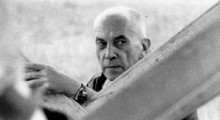Authors — Zachary Wigon
-
Chris Marker and the Image Industry

The idea for this essay first came to me during a GChat conversation with a friend a few weeks ago. We were discussing how my friend, whom I’ll call Martin, had recently met a young man over Grindr, an iPhone app that enables men to meet other men who are looking to hook up at present. Martin told me that after finding this particular young man (whom I’ll call Dave) on the service, Martin – armed with the knowledge of merely Dave’s first name, town of residence and what he looked like – was able to find Dave’s Facebook page, see […]
by Zachary Wigon on Sep 12, 2012 -
A BAD CAREER MOVE: REMEMBERING GORE VIDAL, 1925 – 2012
Sometimes the most upsetting news comes in twos. It was only a few years ago that, in what was surely the toughest one-two punch to cinephiles in modern history, we lost Ingmar Bergman and Michelangelo Antonioni on successive days. Now, it’s happened again: two days after Chris Marker’s passing, Gore Vidal has died. A prolific screenwriter (he was such a good script doctor that, at one point in the 1950s, MGM had him on their weekly payroll) and sometimes-actor (screen appearances included roles in Gattaca and Bob Roberts), his contributions to the film world were notable (Caligula aside – yikes!). […]
by Zachary Wigon on Aug 1, 2012 -
Filmmakers Also Die: Remembering Chris Marker
In Sans Soleil, a cine-essay from 1983 that feels like it’s from 2083 (and remains the paragon of the form), the narrator speaks of an idea for a film. This imaginary film would be about a man on our planet, from the year 4001 AD, who comes back in time to our era and is moved by the realization that in our time, people are capable of forgetting. You see, this time-traveler comes from a future where forgetting is impossible, where humans have figured out how to condition the brain to remember everything. In this future society, memories hold none […]
by Zachary Wigon on Jul 30, 2012 -
This is Where You Work: Eve Sussman

What sparks creativity? It’s safe to assume that an artist’s work environs affect the process of art-making, so perhaps it’s possible by examining those environs to find some of the seedlings of ideas, of productivity, that space engenders to get the mind to engage with work. That was the idea behind the “This Is Where You Work” series, and when I turned my focus to my first subject, filmmaker Braden King, I was a bit shocked by how relevant the idea was – the items and artifacts filling King’s workspace created a sort of map of his personal life and […]
by Zachary Wigon on Jul 24, 2012 -
This is Where You Work: Braden King’s Office

“With all these devices,” Braden King says as he gestures to his iPhone, “you never have to be where you are at all.” The comment is overwhelmingly appropriate, since King’s first narrative feature, HERE, which opens on April 13th at New York’s IFC Center, is about nothing so much as having an appreciation and understanding of where one is. The moment is all the more interesting since King isn’t talking about his film at all; rather, he’s talking about his office space. A connection, regardless, begs to be made. HERE is a formalist reinvention of the road-trip romance, a film […]
by Zachary Wigon on Apr 11, 2012 -
Collision Course: Director Lars von Trier on His End-of-the-World Drama, Melancholia

Though Lars von Trier’s mouth gets him into trouble, the Dane’s incredible story-telling talents are well under control. Melancholia, his latest, is a masterfully beguiling tale of sisters, depression and the end of the world. By Zachary Wigon
by Zachary Wigon on Oct 23, 2011 -
The Cinema is a Train: On Steven McQueen’s Hunger

The Cinema is the Train: Part One Economy of Narrative + Abundance of Truth = Poetry in Cinema In an earlier essay for Filmmaker, I argued that “…cinema’s ‘vocabulary of forms’ is typically under-utilized… While there are any number of cinematic languages that could exist, most of the time films tend to rely heavily upon what we could call the basics of film grammar – shot/counter-shot, close-ups, wide shots, over-the-shoulders and reverses, as well as certain editing paces and conventions of lighting and score,” and went on to praise Enter The Void for its progressive formalism. In keeping with Jean-Luc […]
by Zachary Wigon on Aug 24, 2011 -
Fuller: On Great, Boring Movies and Cultural Vegetables

Unless you are a very serious basketball player — at minimum serious intramural league level, or one of those Wall Street guys who absolutely must blow off a ton of steam by playing their hearts out on the court or else they’ll absolutely lose their soul — there is a very distinct qualitative difference between what it feels like to play basketball for a while and to run for a while. After you finish playing basketball for a while you feel good, you’ve gotten some good cardio, but that cardio is intermittent, the game being filled with plenty of pauses […]
by Zachary Wigon on Jun 7, 2011 -
Human, All Too Human

[Editor’s Note: Spoiler Alert – The ending of Source Code is mentioned in this piece.] “We have only to understand the mirror stage as an identification, in the full sense that analysis gives to the term: namely, the transformation that takes place in the subject when he assumes an image — whose predestination to this phase-effect is sufficiently indicated by the use, in analytic theory, of the ancient term imago. This jubilant assumption of his specular image by the child at the infant stage, still sunk in his motor incapacity and nursling dependence, would seem to exhibit in an exemplary […]
by Zachary Wigon on Apr 7, 2011 -
IN DEFENSE OF ELITISM
Not to pick on Anne Thompson again, a fine industry journalist certainly, but a blog entry she published this past Friday piqued my interest for all the wrong reasons. (See the post, the healthy comments thread, and also David Poland’s response.) Thompson took a critical stance on a new feature of the New York Times’ Carpetbagger section, where lead critics Manohla Dargis and A.O. Scott will provide an in-depth answer to one reader’s question every month. Allowing the critics to choose a question to answer, and giving them some time to work on their response, as opposed (one presumes) to […]
by Zachary Wigon on Feb 21, 2011
